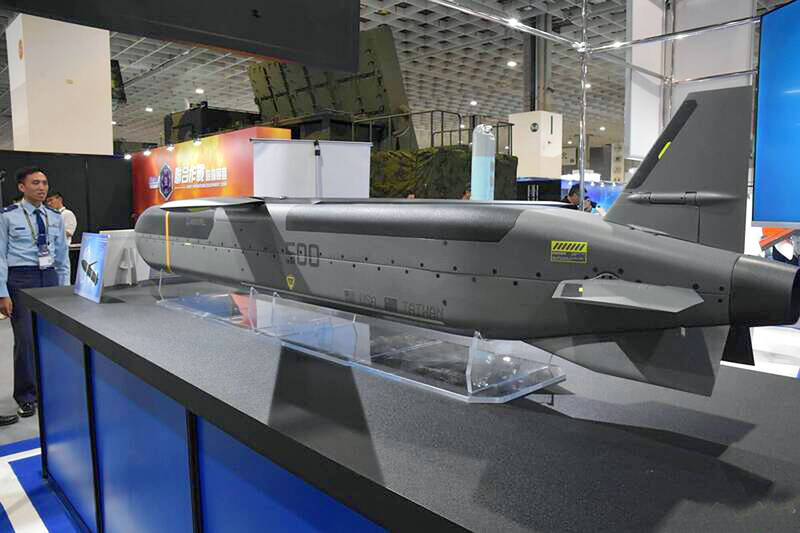Taiwan yesterday unveiled its first missile to be jointly manufactured with a US company, marking a major step in the fast-growing defense cooperation between Taipei and Washington to counter China’s military threat.
President William Lai (賴清德) in June said he would deepen security cooperation with the US and the nation would jointly develop and manufacture weapons.
Ahead of the Taipei Aerospace and Defense Technology Exhibition, the military-owned National Chung-Shan Institute of Science and Technology (NCSIST) put on display Barracuda-500, an autonomous, low-cost cruise missile designed by US defense technology start-up Anduril Industries.

Photo: Wu Che-yu, Taipei Times
The NCSIST said that through technology transfer, it plans to mass produce in Taiwan the missile, designed for group attacks on warships and similar to exploding drones.
The NCSIST declined to offer details such as a timeline for production or expected volume.
"This is a new endeavor. We aim to build our own defense capabilities more swiftly and efficiently, incorporating the latest technologies," NCSIST president Lee Shih-chiang (李世強) said.
Anduril Industries did not respond to a request for comment sent outside of US business hours.
Taiwan’s goal is to build the entire production line locally and to keep the cost per missile below NT$6.5 million (US$216,493), Lee said.
"Should hostilities break out, should we face blockade, we are not like Ukraine, which still has the European continent to provide a steady, uninterrupted flow of reinforcements," he said. "All our resilience must be built upon this island."
Lee said the NCSIST would sign two contracts and six memorandums of understanding with six unspecified US and Canadian companies during the three-day trade show that opens today.
Taiwan has set a goal of spending 5 percent of its GDP on defense by 2030, up from a target of 3.3 percent next year, and is keen for greater international support aside from the US.

Taiwan has received more than US$70 million in royalties as of the end of last year from developing the F-16V jet as countries worldwide purchase or upgrade to this popular model, government and military officials said on Saturday. Taiwan funded the development of the F-16V jet and ended up the sole investor as other countries withdrew from the program. Now the F-16V is increasingly popular and countries must pay Taiwan a percentage in royalties when they purchase new F-16V aircraft or upgrade older F-16 models. The next five years are expected to be the peak for these royalties, with Taiwan potentially earning

STAY IN YOUR LANE: As the US and Israel attack Iran, the ministry has warned China not to overstep by including Taiwanese citizens in its evacuation orders The Ministry of Foreign Affairs (MOFA) yesterday rebuked a statement by China’s embassy in Israel that it would evacuate Taiwanese holders of Chinese travel documents from Israel amid the latter’s escalating conflict with Iran. Tensions have risen across the Middle East in the wake of US and Israeli airstrikes on Iran beginning Saturday. China subsequently issued an evacuation notice for its citizens. In a news release, the Chinese embassy in Israel said holders of “Taiwan compatriot permits (台胞證)” issued to Taiwanese nationals by Chinese authorities for travel to China — could register for evacuation to Egypt. In Taipei, the ministry yesterday said Taiwan

Taiwan is awaiting official notification from the US regarding the status of the Agreement on Reciprocal Trade (ART) after the US Supreme Court ruled US President Donald Trump's global tariffs unconstitutional. Speaking to reporters before a legislative hearing today, Premier Cho Jung-tai (卓榮泰) said that Taiwan's negotiation team remains focused on ensuring that the bilateral trade deal remains intact despite the legal challenge to Trump's tariff policy. "The US has pledged to notify its trade partners once the subsequent administrative and legal processes are finalized, and that certainly includes Taiwan," Cho said when asked about opposition parties’ doubts that the ART was

If China chose to invade Taiwan tomorrow, it would only have to sever three undersea fiber-optic cable clusters to cause a data blackout, Jason Hsu (許毓仁), a senior fellow at the Hudson Institute and former Chinese Nationalist Party (KMT) legislator, told a US security panel yesterday. In a Taiwan contingency, cable disruption would be one of the earliest preinvasion actions and the signal that escalation had begun, he said, adding that Taiwan’s current cable repair capabilities are insufficient. The US-China Economic and Security Review Commission (USCC) yesterday held a hearing on US-China Competition Under the Sea, with Hsu speaking on